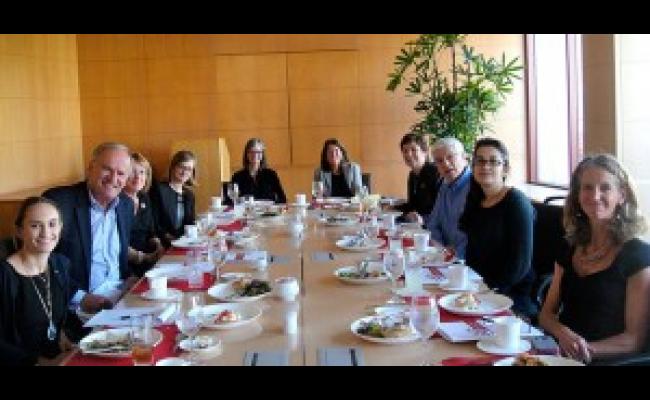By Nancy Staudt, Academic Director, USC Schwarzenegger Institute
The Schwarzenegger Institute hosted its first USC Schwarzenegger Scholarly Roundtable on November 28, 2012—and by all accounts it was a wonderful success. The purpose of the Roundtable was to gather together great minds on campus to discuss important and timely issues the Schwarzenegger Institute is dedicated to addressing, and to strategize potential ways for the Institute to collaborate with USC researchers focused in these areas.
To start the conversation, Global Director Bonnie Reiss outlined the mission of the Schwarzenegger Institute and noted that the Institute sits at the intersection of three exciting areas: public policy, academic research, and media/entertainment. Bonnie noted that our lunch conversation would focus on academic research and the goal of using that research to effectuate important policy changes. I shared one example of a major collaboration that is currently underway between the Schwarzenegger Institute and USC’s Leonard Schaeffer Center on health care reform. This will be a multi-year project that will promote objective, policy-driven health reform research spanning the fields of medicine, law, and economics. Through the study of essential health benefits, exchanges, and the Medicaid expansion, we hope to support and influence state and national policy well into the future.
All of the participants at the Roundtable responded in a lively and thoughtful way. They outlined their own research interests, and noted a variety of opportunities to collaborate. Karen Symms Gallagher, the Dean of USC’s Rossier School of Education, noted that several of her faculty members specialized in K-12 education issues (including Professor Patricia Burch who attended the lunch) and all cared very much about shaping policy through top-notch research. Professor Burcin Becerik-Gerber, recently named one of the top 35 innovators in the world under the age of 35, discussed her policy relevant work on a smartphone application that could be used reduce energy consumption in buildings around the world. Several other participants, including Dan Mazmanian and Detlof von Winterfeldt discussed their work on environmental issues and ideas for potential collaborations down the road. The discussion was so exciting, many of us stayed well after the scheduled end of the luncheon to continue exploring opportunities between the Schwarzenegger Institute and USC scholars.
The Schwarzenegger Institute is inspired not only by USC’s great scholars, but also by the ideas and insights contributed by prominent academics at other leading Universities around the nation—many of whom sit on our Academic Council. We look forward to future collaborations and hope this Scholarly Roundtable will be the first of many.

